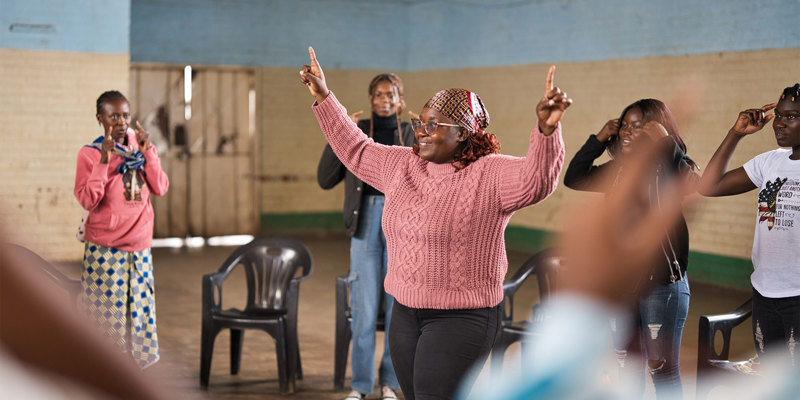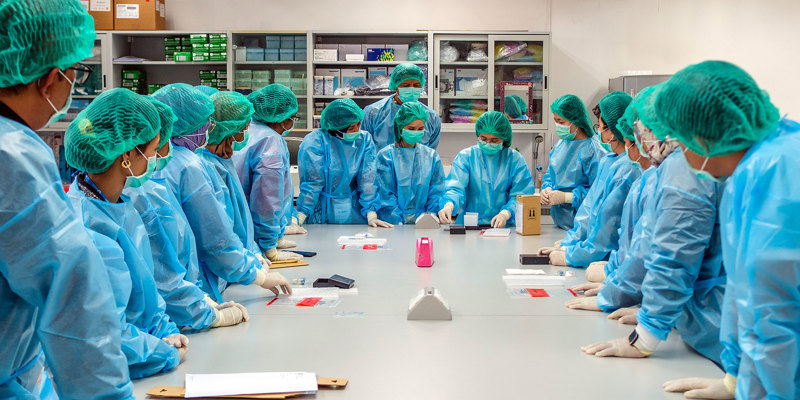Global Fund Provides US$867 Million in Additional Funding for Pandemic Preparedness and Response
14 February 2023
GENEVA – Since December 2022, the Global Fund has awarded US$547 million in additional funding to 40 countries through its COVID-19 Response Mechanism (C19RM) and has now initiated the process to award a further US$320 million, making a total of approximately US$867 million.
These grants are focused on supporting both the immediate COVID-19 response and broader pandemic preparedness, while strengthening the underlying health systems. This includes investments in disease surveillance, laboratory networks, community health worker networks and community-based organizations, medical oxygen and respiratory care systems, as well as the rollout of novel therapeutics to scale up test-and-treat programs in case of future COVID-19 surges. These investments reflect the deliberate rebalancing of C19RM from the immediate COVID-19 response towards strengthening key components of health systems to counter potential future variants and reinforce pandemic preparedness. The total awarded for C19RM since 2020 now amounts to almost US$5 billion.
The Global Fund's C19RM follows a country-led, inclusive, and demand-driven approach to ensure funding goes where it is most needed. Uganda is one such example of how the Global Fund partnership is making a very substantial contribution to address gaps in disease surveillance and strengthen national laboratory systems to reinforce their capacity to detect COVID-19 and other pathogens.
“From the start of the pandemic, the Global Fund took a leading role in supporting low- and middle-income countries like Uganda to scale up testing for the new virus, leveraging 20 years of experience in procuring diagnostics and investing in laboratory capacities and disease surveillance. Most recently in 2022, our strong surveillance systems enabled Uganda to detect the Ebola outbreak in a timely manner, respond and eventually control the outbreak in a record time of 69 days,” said Minister of Health of Uganda Dr. Jane Aceng.
Elsewhere, with a US$30 million investment from the Global Fund, the government of Indonesia and Genome Science Initiative established a nationwide network of facilities able to conduct whole genome sequencing to strengthen early diagnosis and treatment of deadly diseases including tuberculosis, COVID-19, cancer, metabolic disorders, brain diseases and genetic disorders. This funding has benefited organizations like the Center for Environmental Health Engineering and Disease Control in Batam, Indonesia, which today are at the forefront of fighting disease and preparing for future health threats.
The funds are being used to purchase new instruments and train laboratory staff to help ensure facilities across the country are able to harness the new technology and transform the country’s health system.
"Prior to the initiative launching, laboratory workers in Batam had to send samples 1,100 kilometers away to a laboratory in Jakarta to do genomic sequencing, and it would take more than two weeks to get results. Today, they are able to get this same result in less than five days, which is vital in deciding how to respond and manage the disease outbreak as early as possible. The initiative also enhances distributed laboratories capacities throughout the country for genomic surveillance and bioinformatics analysis,” said Minister of Health of Indonesia Budi Gunadi Sadikin.
As part of the process to make the second wave of awards totalling approximately US$320 million, the Global Fund has invited countries to express an interest in having their funding requests considered for inclusion in a potential Global Fund proposal to the Pandemic Fund, which has recently announced a call for proposals for US$300 million in funding. Since there is a strong overlap in the priority areas of investment for both C19RM and the Pandemic Fund, the Global Fund is exploring how to help countries minimize any extra work and maximize the synergies between investments funded from the different sources.







